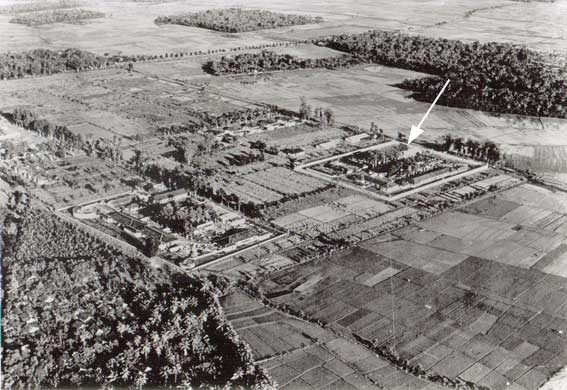The roll call
Every morning we had a roll call, just after we had received our tea.
We all had to stand in line group by group and when the Japanese military came along, he shouted Kjotské and then we all stood straight at attention, our names were called out aloud and we answered that we were present or otherwise the head of the ward or group would tell the Japanese military that someone was not present because she was ill or already at work.
So when at last the whole list was in order the Japanese military shouted Kéré, and we all bowed very deep to show our respect for the Japanese emperor Hirohito.
When the next order Nouré ( stand at ease) came, we sometimes received a last speech about something that would be changed again and that was always for the worse.
At last, thank goodness, came the our last order Jasmé, meaning dismiss!
We were allowed to eat our starch, our breakfast before starting our various daily jobs.The prison Banyu Biru, camp10, menu has always been the same as from the 15 th of February 1944 right until the end of November 1945
Menu;
Tea early in the morning before the roll call.
Breakfast : a bowl of starch
Lunch : a cup of boiled rice, a tablespoon heaped up boiled green cabbage and a teaspoon also heaped up sambal , a sort of Spanish pepper.
Tea in the afternoon.
Dinner : starch soup with a few leaves of cabbage, one could count the small pieces.
As my mother said it so well: It was just enough not to die…too soon.
But in the meantime we discovered another real big problem and that was the malaria mosquito, many of us fell ill, my mother, Jansje and I were among them. Why Henny didn't get malaria, we found out a little later when we saw that she had jaundice.
There were no medicines, no fruit to get a bit better either. There were three doctors, Dr. De Kock a surgeon from Surabaya, his wife was a paediatrician, and then there was Dr. Kruine.
All three of them stood with empty hands, there was extremely little they could do to keep everyone of us alive.
Dr.de Kock has operated one little boy with a razor blade and boiled water, the operation succeeded. It was a real miracle.
The 31 st of August 1944 was our queen Wilhelmina's birthday. Just before midnight that day, the Japanese military called us out of bed and we all, the children as well, had to stand outside the wards and cell's in the Kjotské position, for at least one hour long. I had a tropic ulcer just underneath my foot, very painful while I had to stand for such a long time.
We also had to listen to a long speech all in Japanese and then translated into Dutch. Well to make a long story very short, we all stood there to honour and respect the Japanese emperor Hirohito, and we should be very proud that we could stand here to honour his majesty!
But all we felt was hunger and a lack of sleep. Several ladies were angry because, so they said, this whole comedy was just to insult our queen Wilhelmina.
We were dead tired when we could go back to our dirty mattresses, back to our “homes”. It took us some time to get warm again, because the nights were quite cool. I didn't sleep at all that whole night, my foot hurt me terribly because I had stood too long on this foot.
I decided to see Dr. de Kock the next morning, and so he cut and cleaned the tropic ulcer with his famous razor blade and boiled water and luckily he still had some bandages. I was very grateful and happy that I could walk again.

Banjoe Biroe 10

